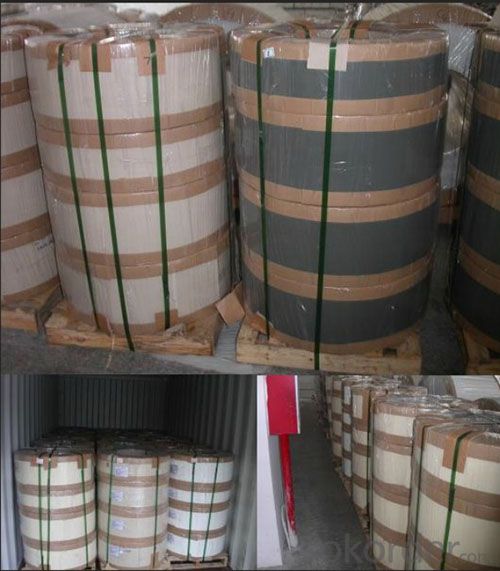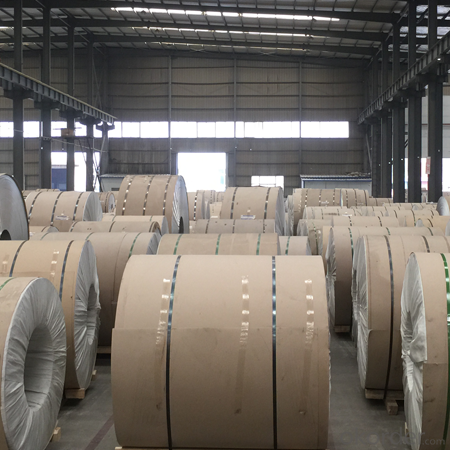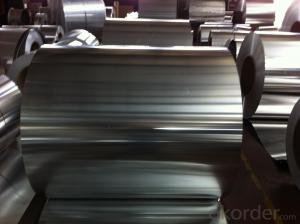Alloy 1100 Aluminium Roll for Roofing/Ceiling/Gutter/Decoration
- Loading Port:
- Shanghai
- Payment Terms:
- TT OR LC
- Min Order Qty:
- 5 m.t.
- Supply Capability:
- 60000 m.t./month
OKorder Service Pledge
OKorder Financial Service
You Might Also Like
Item specifice
Alloy 1100 Aluminium Roll for Roofing/Ceiling/Gutter/Decoration
Specification
Grade
| 1000 Series: 1050 1060 1070 1100 1200 1235 etc. 3000 Series: 3003 3004 3005 3104 3105 3A21 etc. 5000 Series: 5005 5052 5083 5086 5154 5182 5251 5754 etc. 6000 Series: 6061 6063 6082 6A02 etc. 8000 Series: 8006 8011 8079 etc. |
Thickness | 0.05~10mm |
Width | <1600mm< span=""> |
Color | Metallic, Solid, RAL or by customer requirements |
Coating paint: | PVDF(Polyvinylidene Fluoride), PE(Polyester ) |
Coating thickness | as per customer’s request |
Gloss | 10-90%(EN ISO-2813:1994) |
Total coating thick | Polyester18~25micron(EN ISO-2360:1995) PVDF25 ~35micron(EN ISO-2360:1995) |
Coating hardness | 2H |
Protective film | PVC film, Colorless transparent or White-black |
Adhesion | 5B (EN ISO-2409:1994) |
Impact resistance | No cracking and peeling (A.S.T.M D2794-1993) |
Flexibility (T-bend) | 0T- 2T |
Temper | H16, H18, H24, H26, H26 |
Certification | ISO9001:2000, CE, SGS |
Coil's standard diameter | 1100mm |
Inner Diameter | 405mm/505mm |
Coil's standard weight | 2000kgs |
Payment | L/C ,T/T |
Packing


FAQ
Q: How can I request a product sample? A: The samples are free but freight should be collected. Please send sample list and courier account number by email.
Q: How can I request a product catalog? A: The hard copies of catalogs are free but freight should be collected. Please send courier account number by email. You are suggested to request a PDF catalog.
Q: Wha's your payment terms? A: One is T/T 30% before production and 70% against copy of B/L; the other is Irrevocable L/C 100% at sight.
Q: What's your trade terms? A: FOB, CNF(CFR), CIF, EXW.
Q: How long is the quality guarantee? A: All of our products have a period of quality guarantee since time of shipment. Please contact your salesman for more details, as different products enjoy different time of guarantee
- Q:Can aluminum coils be used in electrical conductors?
- Yes, aluminum coils can be used in electrical conductors. Aluminum is a highly conductive metal, second only to copper in terms of electrical conductivity. It possesses excellent electrical properties, making it suitable for use in various electrical applications, including the production of coils. Aluminum coils are commonly used in electrical conductors for applications such as transformers, motors, generators, and power transmission lines. They are lightweight, cost-effective, and offer good thermal conductivity. However, it is important to note that aluminum has a lower tensile strength compared to copper, so proper design considerations must be taken into account to ensure the coil's stability and durability. Additionally, aluminum coils may require larger cross-sectional areas compared to copper coils to achieve the same electrical performance.
- Q:What are the common cleaning and maintenance products for aluminum coils?
- There are several common cleaning and maintenance products that are suitable for aluminum coils. Firstly, a mild detergent mixed with water is a popular choice for cleaning aluminum coils. This solution can be applied to the coils using a soft brush or cloth, and then rinsed off with water. Another commonly used product is a coil cleaner specifically designed for aluminum surfaces. These cleaners are usually available in spray or foam form, and are effective in removing dirt, grease, and oxidation from the coils. It is important to follow the instructions provided by the manufacturer while using these cleaners. In addition, a mixture of white vinegar and water can also be used to clean aluminum coils. This natural cleaning solution is effective in removing mineral deposits and stains from the coils. It can be applied using a cloth or sponge, and then rinsed off with water. Regular maintenance of aluminum coils also involves the use of a coil coating or sealant. These products create a protective layer on the surface of the coils, preventing corrosion and extending their lifespan. It is recommended to apply the coating or sealant as per the manufacturer's instructions. It is important to note that when cleaning and maintaining aluminum coils, it is advisable to avoid using abrasive cleaners, bleach, or harsh chemicals, as they can cause damage to the coils. Additionally, it is recommended to consult the manufacturer's guidelines or seek professional advice if unsure about the appropriate cleaning and maintenance products for specific aluminum coils.
- Q:I want to separate the copper and aluminum so I will get more at the scrap yard for my radiators any one know of an easy way to do this? Thanks
- Does your scrapyard not have a good price for aluminum/copper radiators? Mine does. I Don't think you can separate them short of melting off the aluminum. The copper goes right through it. It would be a lot of work to separate them. Much more work than stripping copper wire. Before I take a load of scrap, I call all of the yards and get the best price. Sometimes this varies as much as $.50/pound on copper and radiators and brass and clean aluminum. Work with your phone, it will make you money. Last I checked, #1 copper 3.10/pound #2: 2.90, Radiators $1.50, Brass $1.40, Insulated copper wire $1.10 to $.90 Aluminum $.85 to $.55 dependingScrap Metal(steel). $9.00/100 Lets recycle Car batteries are $6 ea.
- Q:What are the tensile strength properties of aluminum coils?
- The tensile strength properties of aluminum coils are widely acknowledged for being remarkably high. Aluminum, as a material, possesses a remarkable strength-to-weight ratio, which renders it suitable for diverse applications that necessitate both strength and lightweight characteristics. The specific tensile strength of aluminum coils can vary based on the alloy and temper employed. In general, aluminum coils exhibit a tensile strength ranging from 110-310 MPa (megapascals), or approximately 16,000-45,000 psi (pounds per square inch). These figures denote the maximum tensile stress that the aluminum coil can endure before it fractures or permanently distorts. It should be emphasized that the tensile strength can be further improved through heat treatment procedures like cold rolling or annealing. On the whole, aluminum coils are renowned for their impressive tensile strength properties, which contribute to their extensive utilization in industries such as aerospace, automotive, construction, and manufacturing.
- Q:How many companies have used aluminum coil?
- Too many. All the companies who make the aluminum products you have seen in daily life have used it. So it is hard to explain.
- Q:How do I deal with too much aluminum powder when the aluminum strips are divided?
- Because of low maintenance costs, the former favored by enterprises, accounting for more than 90% of all dust removal systems, but often there will be a problem: ventilation and dust removal system is not strictly in accordance with the specifications to do, resulting in dust accumulation.
- Q:wikipedia says welding aluminum by means of stick welding is possible but i have always been told TIG is the only way to weld aluminum. what do i need in order to stick weld aluminum? BTW i have a Lincoln Electric AC 225 Stick Welder
- You can buy aluminum welding rods for stick welding aluminum but it is hard to weld on thicknesses less than 3/16 of an inch with stick without practice. TIG is your best bet on lighter material. You also have to match the rods to the same alloy of aluminum base material you are welding.
- Q:Calculate the specific heat of aluminum (in calories).mass of aluminum25.0 gmass of water23.2ginitial temperature of aluminum98.0Cinitial temperature of water20.0Cfinal temperature of water33.0Cround to three decimal places, do not include units.
- Heat gained by water = heat lost by aluminum Heat = H mass = m specific heat =c change in temperature = dT H = mcdT mcdT for water = mcdT for Al (23.2)(1.00)(13) = (25.0)(c(Al))(33-98) c(Al) = (23.2)(1.00)(13)/(25.0)(65) = 0.186 This value is just a bit below the known value of specific heat for aluminum, where c = 0.217 cal/g.C
- Q:Can aluminum coils be used in the production of automotive parts?
- Indeed, automotive parts can be produced using aluminum coils. As a lightweight and highly malleable metal, aluminum is an excellent choice for manufacturing various components in the automotive industry. Body panels, hoods, fenders, doors, and even engine parts can all be fabricated using aluminum coils. The utilization of aluminum in this sector presents several benefits, such as enhanced fuel efficiency, superior performance, and reduced vehicle weight. Furthermore, aluminum coils are easily manipulable and can be shaped into intricate forms, allowing for greater design adaptability in the manufacturing of automotive parts. In conclusion, the use of aluminum coils has become increasingly popular in recent years and is now a common practice in the production of automotive components.
- Q:Can aluminum coils be used in the production of lighting fixtures?
- Indeed, the utilization of aluminum coils is viable in the manufacturing process of lighting fixtures. Being both lightweight and durable, aluminum qualifies as an exceptional metal that effectively resists corrosion, rendering it an ideal preference for the production of lighting fixtures. With the ability to be effortlessly manipulated and molded into diverse configurations and dimensions, aluminum coils can readily accommodate the precise requisites of lighting fixtures. Moreover, aluminum boasts remarkable thermal conductivity, facilitating efficient dissipation of heat within lighting fixtures, guaranteeing optimum performance and durability. In summary, aluminum coils furnish a cost-efficient and adaptable resolution for the production of lighting fixtures.
1. Manufacturer Overview |
|
|---|---|
| Location | |
| Year Established | |
| Annual Output Value | |
| Main Markets | |
| Company Certifications | |
2. Manufacturer Certificates |
|
|---|---|
| a) Certification Name | |
| Range | |
| Reference | |
| Validity Period | |
3. Manufacturer Capability |
|
|---|---|
| a)Trade Capacity | |
| Nearest Port | |
| Export Percentage | |
| No.of Employees in Trade Department | |
| Language Spoken: | |
| b)Factory Information | |
| Factory Size: | |
| No. of Production Lines | |
| Contract Manufacturing | |
| Product Price Range | |
Send your message to us
Alloy 1100 Aluminium Roll for Roofing/Ceiling/Gutter/Decoration
- Loading Port:
- Shanghai
- Payment Terms:
- TT OR LC
- Min Order Qty:
- 5 m.t.
- Supply Capability:
- 60000 m.t./month
OKorder Service Pledge
OKorder Financial Service
Similar products
New products
Hot products
Related keywords





























